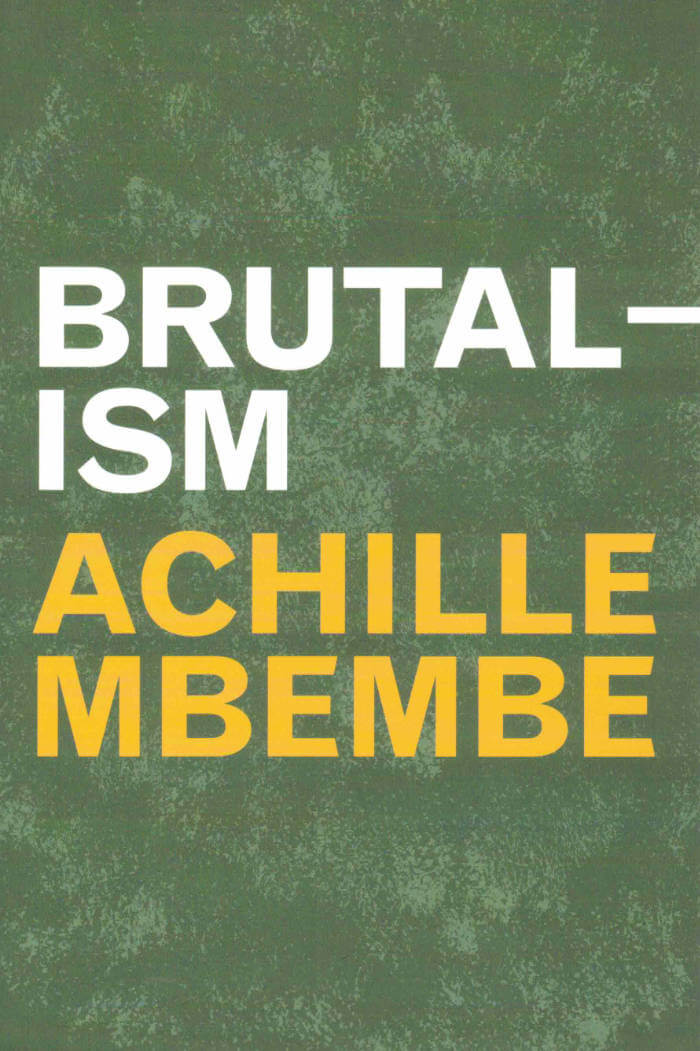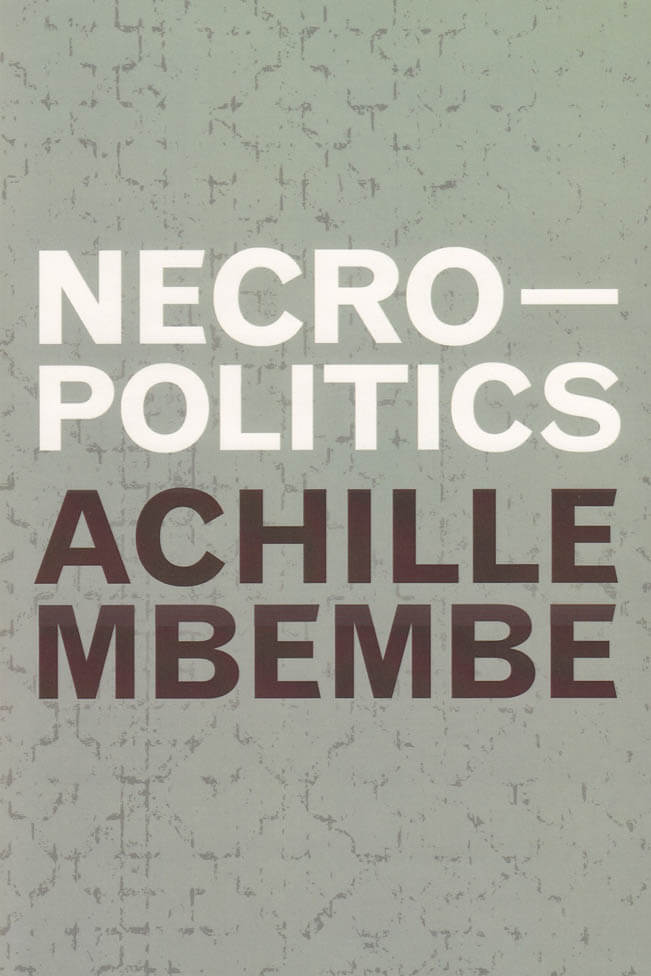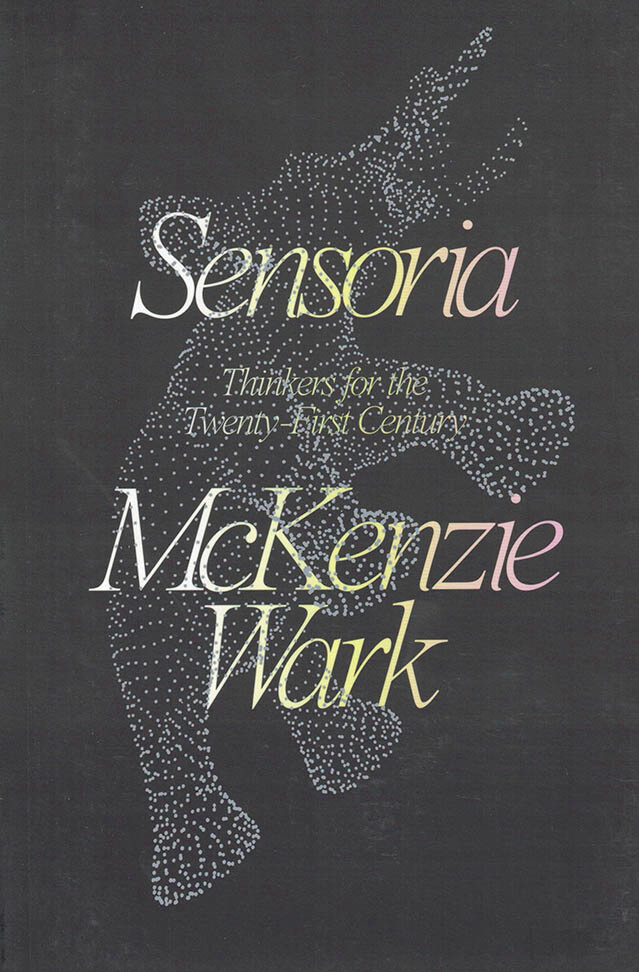Achille Mbembe
Achille Mbembe

Brutalism
In Brutalism, eminent social and critical theorist Achille Mbembe invokes the architectural aesthetic of brutalism to describe our moment, caught up in the pathos of demolition and production on a planetary scale.
Just as brutalist architecture creates an affect of overwhelming weight and destruction, Mbembe contends that contemporary capitalism crushes and dominates all spheres of existence. In our digital, technologically focused era, capitalism has produced a becoming-artificial of humanity and the becoming-human of machines. This blurring of the natural and artificial presents a planetary existential threat in which contemporary society’s goal is to precipitate the mutation of the human species into a condition that is at once plastic and synthetic.
Mbembe argues that Afro-diasporic thought presents the only solution for breaking the totalizing logic of contemporary capitalism: repairing that which is broken, developing a new planetary consciousness, and reforming a community of humans in solidarity with all living things.

Necropolitics
In Necropolitics Achille Mbembe, a leader in the new wave of francophone critical theory, theorizes the genealogy of the contemporary world, a world plagued by ever-increasing inequality, militarization, enmity, and terror as well as by a resurgence of racist, fascist, and nationalist forces determined to exclude and kill. He outlines how democracy has begun to embrace its dark side—-what he calls its “nocturnal body”—-which is based on the desires, fears, affects, relations, and violence that drove colonialism. This shift has hollowed out democracy, thereby eroding the very values, rights, and freedoms liberal democracy routinely celebrates. As a result, war has become the sacrament of our times in a conception of sovereignty that operates by annihilating all those considered enemies of the state. Despite his dire diagnosis, Mbembe draws on post-Foucauldian debates on biopolitics, war, and race as well as Fanon's notion of care as a shared vulnerability to explore how new conceptions of the human that transcend humanism might come to pass. These new conceptions would allow us to encounter the Other not as a thing to exclude but as a person with whom to build a more just world.
(October 2019)
And more

Globalisto – A Philosophy in Flux – Acts of an Imbizo
Alexandre Quoi, Ntshepe Tsekere Bopape (Mo Laudi)
The continuation and culmination of a vast project, articulated between an exhibition and a symposium, imagined by South African curator Ntshepe Tsekere Bopape (Mo Laudi), inviting 17 artists from Africa and its diaspora and a group of researchers to evoke black aesthetics and propose an alternative vision of a world without borders.
In Zulu, imbizo means "gathering" which is called by the elders when there are communal problems so that everyone listens to each other to see how solutions can evolve. The book Globalisto. A philosophy in flux. Acts of an Imbizo is intended as a hybrid between a catalogue of the exhibition held at MAMC+ from 25 June to 16 October 2022 and the publication of the proceedings of the symposium held on 6 and 7 October 2022. The book is therefore in two parts.
The first part reports on Imbizo part 1: the opening, and on the exhibition curated by Ntshepe Tsekere Bopape (Mo Laudi) and Aurélie Voltz, director of MAMC+, which brought together artworks by seventeen artists: Sammy Baloji, Raphaël Barontini, Marie Aimée Fattouche, Sam Gilliam, Porky Hefer, Lubaina Himid, Arthur Jafa, Euridice Zaituna Kala, Samson Kambalu, Moshekwa Langa, Myriam Mihindu, Wilfried Nakeu, Otobong Nkanga, Josèfa Ntjam, Sara Sadik, Dread Scott and Gerard Sekoto. A 32-page glossy booklet follows the exhibition line-up, showing at least one reproduction of each artist's work. The playlist that was available to listen to in the first exhibition room has found its place in the book in the same way as a list of works—a flashcode link refers the person who wishes to read the book while listening to music.
The second part of the book, which is its main body, publishes a written transcription of the contributions of the speakers at Imbizo part 2: the symposium on "Art and (de)colonisation". You will find lectures by academics (Norman Ajari, Amal Alhaag, Christine Eyene, Elvan Zabunyan) as well as more visual essays, conceived as transpositions of performances (Jamika Ajalon, Elsa M'Bala) and a more oral proposition, a transcription of a podcast by the Piment collective that took place live in the MAMC+ auditorium. Three interviews introduce the proceedings. The first, with the curator Mo Laudi, is taken from a special issue of Le 1 Hebdo devoted to the "Globalisto" exhibition. The second is a continuation of the first, conducted by Aurélie Voltz, director of the MAMC+, who asks the curator about the follow-up to his project. The last is also a second publication, originally published in Le 1 Hebdo, in which journalists Iman Amhed, Laurent Greilsamer and Maxence Collin interview philosopher Achille Mbembé.
Contributions by Aurélie Voltz, Ntshepe Tsekere Bopape (Mo Laudi), Iman Ahmed, Maxence Collin, Achille Mbembe, Norman Ajari, Christine Eyene, Elvan Zabunyan, Jamika Ajalon, Amal Alhaag, Elsa M'Bala.

Living with Ghosts: A Reader
Living With Ghosts explores the ways the unresolved traumas of Africa’s colonial past, and its unfulfilled project of decolonisation, continue to haunt the present global order. The reader further expands on these complex ideas through philosophical, historical, and literary approaches. Reprinted texts by thinkers such as Achille Mbembe, C.L.R. James, and Sabelo J. Ndlovu-Gatsheni explore the historical experiences of the African postcolony and the problematics of decolonisation. Meditations on artists including John Akomfrah and Abraham Oghobase provide engaging entry points to their multi-layered artistic practices. Also featured are images of artworks in the exhibition and an in-depth conversation between Bouchra Khalili and KJ Abudu.
Texts by Achille Mbembe, Jacques Derrida, C.L.R. James, Sabelo J. Ndlovu-Gatsheni, KJ Abudu, Emmanuel Iduma, Walter D. Mignolo, Avery F. Gordon, Adjoa Armah, Joshua Segun-Lean. Conversation with Bouchra Khalili and KJ Abudu.

Pasts, Futures, and Aftermaths: Revisiting the Black Dada Reader
The sequel to Pendleton's acclaimed Black Dada Reader, compiling an anti-canon of radical experimentation and thought.
In 2011, artist Adam Pendleton (born 1984) assembled Black Dada Reader, a compendium of texts, documents and positions that elucidated a practice and ethos of Black Dada. Resembling a school course reader, the book was a spiral-bound series of photocopies and collages, originally intended only for personal reference, and eventually distributed informally to friends and colleagues. The contents - an unlikely mix of Hugo Ball, W.E.B. Du Bois, Adrian Piper, Gertrude Stein, Sun Ra, Stokely Carmichael, Gilles Deleuze -formed a kind of experimental canon, realized through what Pendleton calls radical juxtaposition. In 2017, Koenig Books published the Reader in a hardcover edition, with newly commissioned essays and additional writings by the artist. A decade later, Pendleton has composed another reader, building upon the constellation of writers, artists, filmmakers, philosophers and critics that emerged in the first volume.
Source texts by Sara Ahmed, Mikhail Bakhtin, Toni Cade Bambara, Amiri Baraka, Augusto de Campos, Hardoldo de Campos, and Décio Pignatari, Angela Davis, Gilles Deleuze, Julius Eastman, Adrienne Edwards, Clarice Lispector, Achille Mbembe, Philippe-Alain Michaud, Charles Mingus, Piet Mondrian, Leslie Scalapino, Leonard Schwartz and Michael Hardt, Juliana Spahr, Cecil Taylor and Malcolm X.

Sensoria
As we face the compounded crises of late capitalism, environmental catastrophe and technological transformation, who are the thinkers and the ideas who will allow us to understand the world we live in? McKenzie Wark surveys three areas at the cutting edge of current critical thinking: design, environment, technology and introduces us to the thinking of nineteen major writers. Each chapter is a concise account of an individual thinker, providing useful context and connections to the work of the others.
The authors include: Sianne Ngai, Kodwo Eshun, Lisa Nakamura, Hito Steyerl, Yves Citton, Randy Martin, Jackie Wang, Anna Lowenhaupt Tsing, Achille Mbembe, Deborah Danowich and Eduardo Viveiros de Castro, Eyal Weizman, Cory Doctorow, Benjamin Bratton, Tiziana Terranova, Keller Easterling, Jussi Parikka.
Wark argues that we are too often told that expertise is obtained by specialisation. Sensoria connects the themes and arguments across intellectual silos. They explore the edges of disciplines to show how we might know the world: through the study of culture, the different notions of how we create such things, and the impact that the machines that we devise have had upon us. The book is a vital and timely introduction to the future both as a warning but also as a road map on how we might find our way out of the current crisis.
McKenzie Wark is the author of Capital is Dead, General Intellects and Molecular Red among other books. She teaches at the New School for Social Research and Eugene Lang College in New York City.